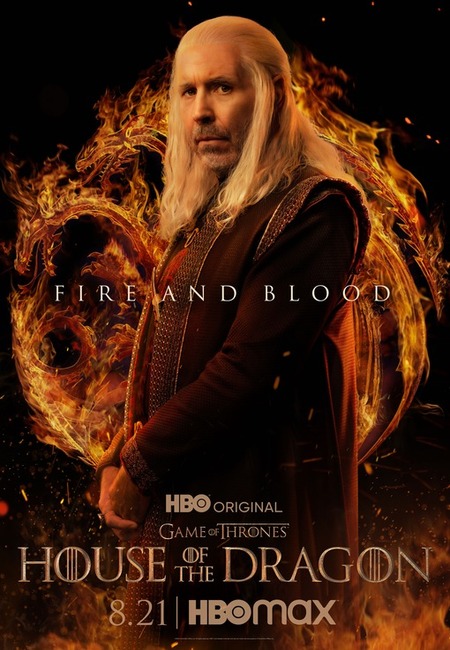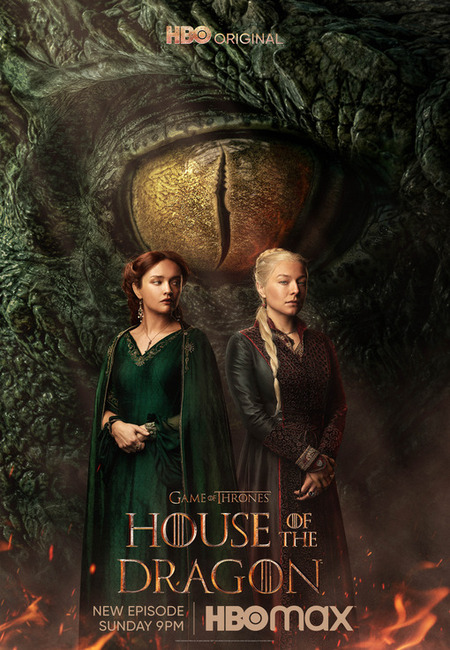SPOILERS AHEAD … AND DRAGONS … AND POWER HUNGRY REGRET …
As an exploration of how power, both the attaining of it or its oft damning pursuit, corrupts, you can’t go past the quietly searing excoriation of House of the Dragon, with episodes four to six of its first season underscoring in tones bleakly accusatory and gougingly personal how much rising to the top of the pile can cost you.
A prequel of sorts to the watercooler sensation Game of Thrones, House of the Dragon is all about power, with those who have it unsure if they are wielding it successfully – current occupier of the Iron Throne, King Viserys I Targaryen (Paddy Considine) experiencing more existential crises than he has bouts of leach-treated illness – and those who want it trading away friendship, nuanced parenting and any semblance of apparent happiness to ensure that the power they crave eventually falls into their hands.
It all makes for gripping drama, of course, and the franchise is nothing if not power in all its many forms and how it wreaks havoc upon the human condition, often becoming an albatross around the neck rather than a crown upon the head, but where House of the Dragon succeeds, possibly even more than it’s predecessor/ chronological successor, is in focusing in harrowing detail on how the people in positions of power are often the most miserable of all.
This is brought grimly to the fore in episode six, “The Princess and the Queen”, where a decade-long time jump sees the nascent resurgence of the one-time friendship between teenage Princess Rhaenyra Targaryen (Milly Alcock) and her best friend/stepmother/new queen Lady Alicent Hightower (Emily Carey) dashed on the rocks of reaching for power that may never belong to either power.
Now played by Emma D’Arcy and Olivia Cooke respectively, Rhaenyra and the Queen are locked in a bitter struggle to see who will come out on top in the endless jockeying for power in the kingdom of Westeros, which might be enjoying unparalleled piece and prosperity but which is riven by grappling for power in all kinds of forms, not least between ambitious lords who constantly look for ways to extend and strengthen their influence.
With Viserys having decided to stick with Rhaenyra as his successor, a decision which has put countless misogynistic noses out of joint with even a number of leading women in the court happy to betray their own gender to uphold the unthinking scleroticism of the established order, and a growing awareness by Rhaenyra and the Queen, both now mothers to growing broods (though one is leaping ahead by leaps and bounds quite controversially), that whichever one arises the victor will mean the death of the other wing of the family, power is all anyone ever thinks about it.
In that respect, it’s very much the same old same old but in these quietly desperate episodes of House of the Dragon, where we don’t quite get a red wedding but we come fierily close, it becomes starkly apparent that while there is something alluring about being at the seat of power, it can cost a great deal without any real assurance that it will lead anywhere worthwhile.
In fact, for many people, while power is always what motivates them, coming into contact with it, doesn’t really do them any favours.
Time and again we see people power treat people like the expendable pawns in its machinations that they are.
People like Ser Criston Cole (Fabien Frankel), protector (and eventually spurned lover) of Rhaenyra, who indulges one night in some disguised real world hijinks in the city’s pleasure houses and taverns with her troubled, power hungry uncle Prince Daemon Targaryen (Matt Smith) who is himself allured by power and damned by his inability to hold onto it, and Ser Harwin Strong (Ryan Corr) who secretly, or not so secretly as court gossip makes graphically clear in loud, crashing whispers, has sired Rhaenyra’s three sons in order to give her marriage to Ser Laenor Velaryon (John Macmillan as an adult / Thoe Nate as a teenager) and, more importantly, her claim to the throne, the required amount of progeny-bolstered legitimacy.
They are but two examples of many – the two Hands of the King, Ser Otto Hightower (Rhys Ifans) and his successor Lord Lyonel Strong (Gavin Spokes) are also part of the same blighted club – who fall into the orbit of power, only to find misfortune and great loss following them.
While House of the Dragon is not avowedly a morality tale, its ambitions lying demonstrably in the intriguing machinations of mongering for the Iron Throne, it is all but that thing, a sobering tale of how the very thing people want often ends up taking all the life from them until all they have left is a mere sliver of what they once dreamed it would be.
No one will ever admit that of course, although Rhaenyra’s departure, at the end of the sixth episode, to Dragonstone to escape the snake pit of King’s Landing, full of poison thanks to Lady Alicent’s fetid need to shore up her precarious position and that of her sons and daughter, speaks to the fact that being close to power is often not worth what it gouges from you.
If anyone has cause to ponder on the balance between gains and losses, it is Rhaenyra who forsakes a twisted love with her uncle and a more genuine love with Ser Criston to hold into her position as heir, embracing the very prison of responsibility that comes with being the Queen-to-be, a role she once openly despised, only to have it make her life, save for the love of her sons and her father’s continued protection (though tempered now by the Queen who has his ear more than his daughter does), an endless cycle of advance and circling the wagons depending on which way the winds of power are blowing for her.
There is, of course, a great deal going on in these three episodes, with House of the Dragon possessing the same labyrinthine narrative and sprawling case of Game of Thrones, though not its geographic spread, but the central overweening sense throughout the slow-moving and considered but action-packed storyline is that power may offer a great many glittering rewards and autonomy of choice and action but it can also imprison and silence you, suck the life from you (often quite literally) and eviscerate all your hopes and dreams until all you have left is a smoking ruin and a cloying sense that perhaps you have placed your bets on the wrong horse and perhaps should have sailed for somewhere far from the action while you still have time.
House of the Dragon is currently streaming on HBO and HBO Max and in Australia on Binge.

